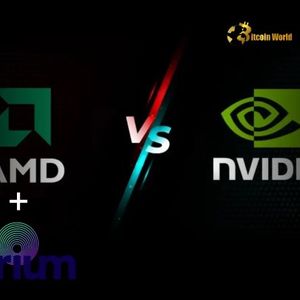AI Hardware Market: AMD Acquires Brium in Bold Challenge to Nvidia
4 min read
BitcoinWorld AI Hardware Market: AMD Acquires Brium in Bold Challenge to Nvidia In the fast-evolving world of artificial intelligence, the underlying infrastructure – the hardware – is king. For those watching the crypto space and broader tech industry, the battle for supremacy in the AI Hardware Market is a major theme. Recently, semiconductor giant AMD made a significant move that could reshape this landscape. Understanding the Challenge: Tackling Nvidia AI Dominance For years, Nvidia has held a commanding lead in the AI hardware sector, particularly with its GPUs that have become the standard for training and deploying complex AI models. A significant challenge for competitors like AMD is that much of the existing AI software ecosystem is heavily optimized for Nvidia’s architecture. This creates a high barrier to entry for developers looking to use alternative hardware, even if those alternatives offer strong performance. AMD’s latest strategic move directly addresses this challenge. By acquiring Brium, an AI software optimization startup, AMD aims to make it easier for AI software to run efficiently on its own hardware, thereby chipping away at Nvidia’s entrenched position. What is Brium and How Does it Help with AI Software Optimization ? Brium, though seemingly operating in stealth mode until this announcement, focuses on a critical area: enabling AI inference across diverse hardware. Inference is the process where a trained AI model uses new data to make predictions or decisions. While AI training is computationally intensive, inference is where AI models are widely deployed and utilized. Brium’s technology is designed to help retrofit or adapt AI software that might have originally been built and optimized for one type of hardware (like Nvidia GPUs) to function effectively on others, including AMD’s offerings. Their own blog post highlighted this industry challenge, noting that while AMD’s Instinct GPUs offer strong performance, harnessing it can be difficult because workloads are typically tuned for Nvidia. This acquisition is fundamentally about bridging the software gap. By improving AI Software Optimization for its own chips, AMD makes its hardware a more viable and attractive option for developers and companies building and deploying AI applications. AMD’s Broader AMD AI Strategy The Brium acquisition isn’t an isolated event; it’s part of a larger, deliberate AMD AI Strategy focused on building an open, high-performance AI software ecosystem. This is AMD’s fourth acquisition in the AI software space within the last two years, demonstrating a clear pattern of investment in this critical area. Previous acquisitions include: Silo AI (July 2024): Focused on custom AI solutions and services. Nod.AI (October 2023): Specializing in AI model optimization and deployment. Mipsology (August 2023): Known for its AI inference acceleration technology. While AMD frames this strategy around fostering openness, it’s also a pragmatic approach to gain market share. By making their hardware easier to use with existing and future AI software, AMD directly competes for workloads currently running primarily on Nvidia hardware. Implications for Semiconductor Competition The rivalry between AMD and Nvidia is a defining feature of the modern Semiconductor Competition . While they compete across various markets, the AI sector has become arguably the most important battleground due to explosive growth in AI adoption. Nvidia’s lead in AI hardware is significant, driven by both their powerful chips and the robust CUDA software platform that developers rely on. AMD’s approach with acquisitions like Brium, coupled with its investment in open-source initiatives like ROCm, aims to provide a compelling alternative. By improving software compatibility and performance on AMD hardware, the company hopes to persuade more customers to diversify their AI infrastructure away from a single vendor. The success of AMD’s strategy will depend on how effectively Brium’s technology can be integrated and how widely developers adopt AMD’s platforms for AI workloads. If successful, it could lead to increased competition, potentially benefiting consumers and businesses through more hardware options and innovation. Summary: A Strategic Play in the AI Hardware Battle AMD’s acquisition of Brium is a strategic move aimed squarely at reducing Nvidia’s substantial lead in the AI hardware market. By acquiring expertise in AI software optimization, AMD is tackling one of the biggest hurdles to wider adoption of its own AI chips: software compatibility. This fits into AMD’s broader strategy of building an open AI ecosystem through targeted acquisitions. The outcome of this intensified semiconductor competition in the AI space will be crucial for the future of artificial intelligence development and deployment. To learn more about the latest AI market trends, explore our article on key developments shaping AI features. This post AI Hardware Market: AMD Acquires Brium in Bold Challenge to Nvidia first appeared on BitcoinWorld and is written by Editorial Team

Source: Bitcoin World



